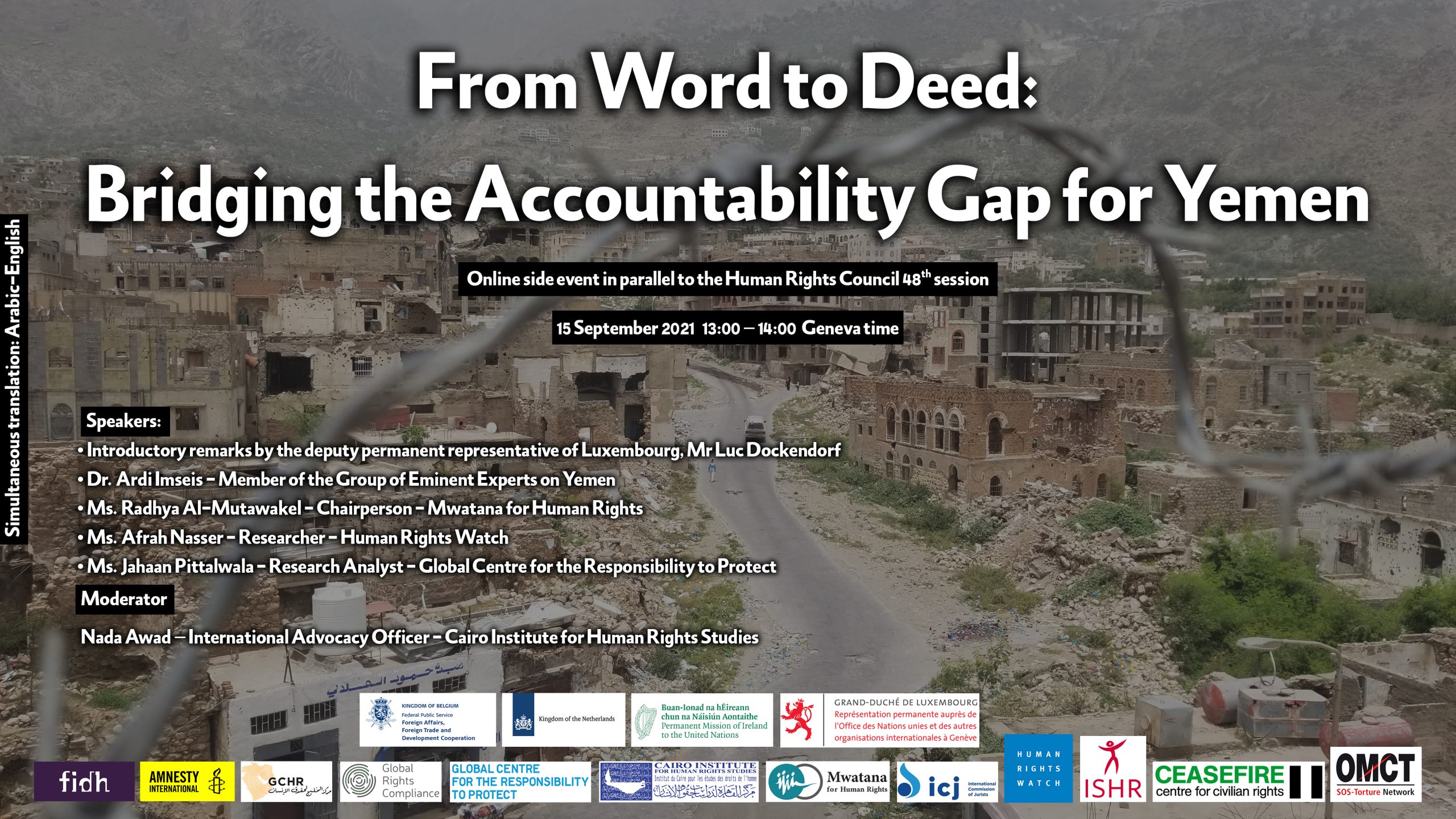Yemen: “A nation abandoned”
On 15 September 2021, the Cairo Institute for Human Rights Studies (CIHRS), along with civil society groups from around the world[1] and the United Nations missions of Belgium, Ireland, Luxembourg and the Netherlands, co-hosted an event at the 48th Session of the UN Human Rights Council to address the urgent need to end the “pandemic of impunity” in Yemen.
Entitled From Word to Deed: Bridging the Accountability Gap for Yemen, the event represented the first time that NGOs and state delegations have come together to outline practical steps the UN can take to ensure that individuals and groups are held criminally responsible for violations of international humanitarian and human rights law in Yemen.
The event follows an open letter to UN member states from 62 civil society organizations calling on the Human Rights Council to establish an international criminally-focused investigative mechanism for Yemen. The organizations emphasized that “the fate of millions of Yemenis depends in large part on the international community’s implementation of effective measures to put an end to the impunity enjoyed by all parties to the conflict.”
In his opening remarks Deputy Permanent Representative of Luxembourg Mr Luc Dockendorf, stressed that “it is now time for the Human Rights Council to step up to the plate and ensure that there is accountability for the crimes and atrocities committed against the people of Yemen.”
Member of the Group of Eminent Experts on Yemen Dr. Ardi Imseis reiterated the GEE’s recommendations to UN member states on the issue of accountability. Dr. Imseis focused on the need to create an international investigation mechanism for criminal justice in Yemen (similar to the Commission of Inquiry established on Syria and on Myanmar). This mechanism would collect and preserve evidence to ensure criminal accountability before relevant courts of law.
Ms Radhya Almutawakel Chairperson at Mwatana for Human Rights reminded the audience that Yemen is facing the world’s largest humanitarian catastrophe – one caused by ongoing violations of international law and requiring urgent action to prevent further deaths and destruction. “We need a criminal investigation now – to protect the people of Yemen”. Today, over 400,000 Yemeni children are at risk of dying and 16.2 million people face acute food insecurity.
Ms Afrah Nasser, researcher at Amnesty International addressed violations by warring parties targeting the judiciary, leading to violations, including the targeting of journalists and human rights defenders, explaining that a mechanism would support much needed accountability in Yemen.
Ms. Jahaan Pittalwala, Research Analyst at the Global Center for the Responsibility to protect, highlighted the deadlock at the UN Security Council on the ICC referral of the situation of Yemen, emphasizing the need to create a criminally-based accountability mechanism, which would complement existing UN mechanisms and ensure criminal accountability.
It is noteworthy that this event, which was moderated by Nada Awad, International Advocacy Officer at the Cairo Institute for Human Rights Studies, occurred a day after the UN Group of Eminent Experts on Yemen (GEE) delivered their latest report to the Human Rights Council (the Council) entitled “A nation abandoned: A call to end Yemen’s suffering.” The report exposes ongoing and widespread atrocities being committed by all parties to the conflict and condemns a lack of political will to protect the people of Yemen and ensure an end to the conflict.
In response to the report, NGOs and UN member states took the floor to back calls for strengthened accountability, including providing a multiyear mandate for the GEE and to take steps to ensure criminal accountability for crimes committed in Yemen.
Watch the webinar in English here
[1] FIDH, Amnesty International, GCHR, GRC, GCRP, Mwatana for Human Rights, ICG, HRW, ISHR, Ceasefire Center for Human Rights, and OMCT.
Share this Post

